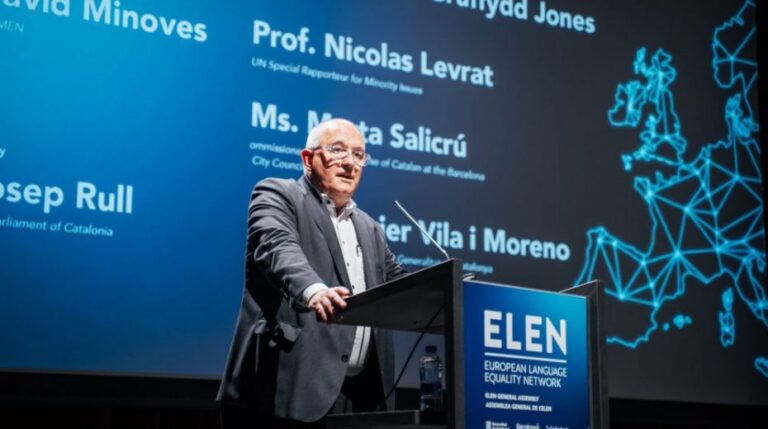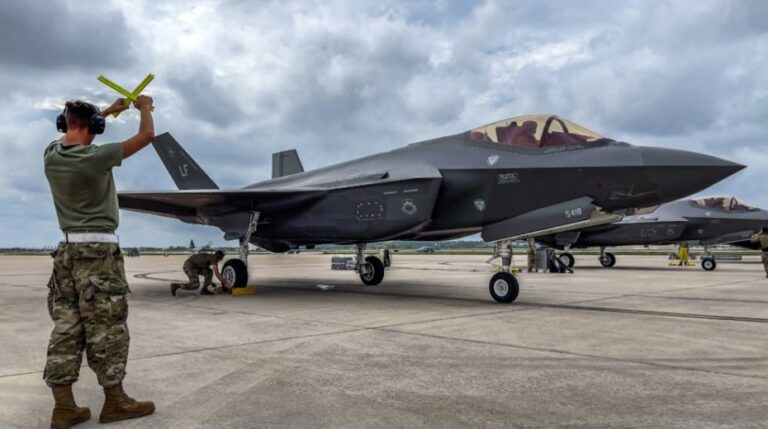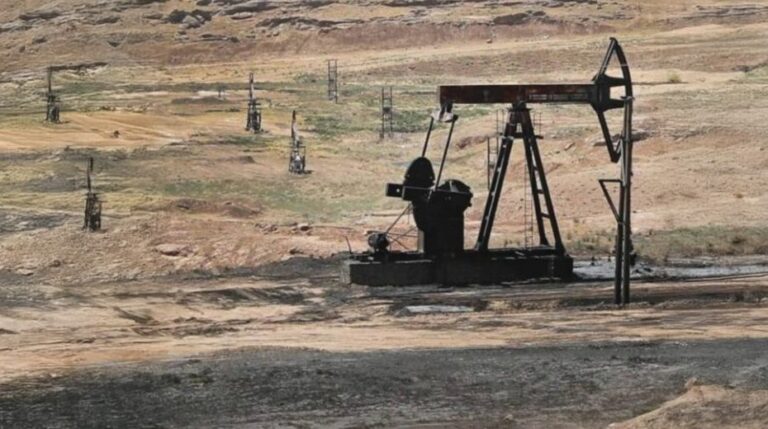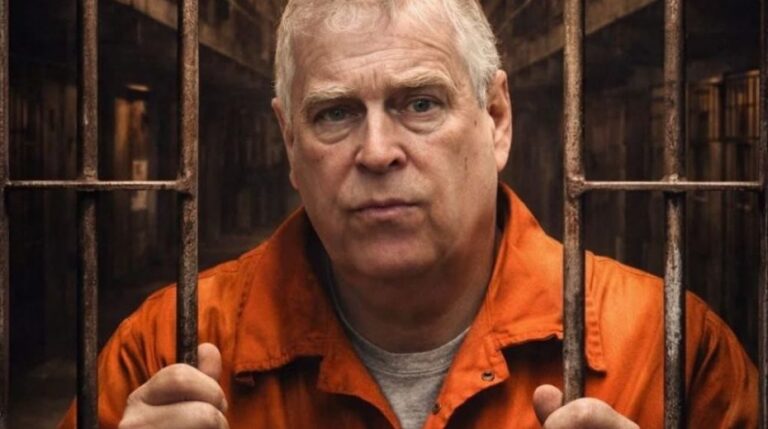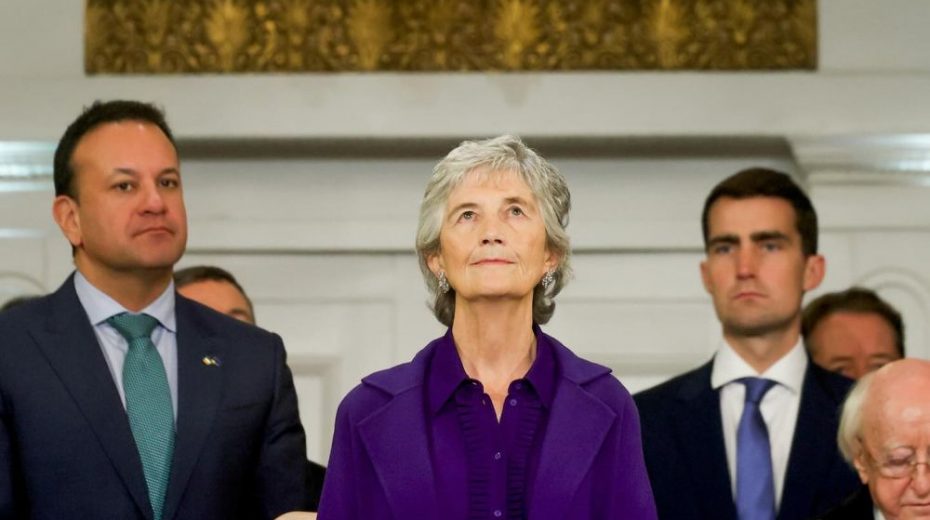
The outspoken new Irish president on Israel and NATO was inaugurated today and already the knives are out for her, writes Mick Hall.
On the day Catherine Connolly took office as Ireland’s 10th president at Dublin Castle, opposition to the nation’s neutral stance grew louder amid discussions on potential sanctions against Israel for alleged genocide.
Connolly, 68, secured a decisive win last month with more than 63 percent of the vote, her firm stance against war and genocide striking a chord with voters, though causing unease in Western power centers.
This development signals that the anti-imperialist left’s success has rallied entrenched interests both domestically and internationally.
Robert C. O’Brien, a former White House national security advisor, noted in The Wall Street Journal last week that the Trump administration would no longer accept nations that benefit from U.S. economic and military power while adopting policies contrary to American interests.
He stated:
“Ireland’s President-elect embodies the antagonism towards American interests,” adding:
“Ireland is finding its voice in international affairs, but it’s one that seems increasingly hostile to US interests. Ireland is the most antagonistic country to Israel in the Western world … Ireland was one of the first Western democracies to recognise a Palestinian state unilaterally, and it is at the forefront of allegations of ‘genocide’ against Israel. Meanwhile Dublin courts Chinese investment with no mention of Beijing’s human rights record, economic coercion or regional aggression.”
In January, Ireland formally joined South Africa’s case against Israel at the International Court of Justice, accusing Israel of breaching the Genocide Convention. The country has also consistently remained out of NATO, refusing to join the military integration embraced by much of Europe.
Increasing pressure is building over Ireland’s reluctance to side with the imperial West, with U.S. neoconservatives now scrutinizing even civil society groups.
Graham Chimes In
Over the weekend, Republican senator Lindsey Graham threatened consequences for the Football Association of Ireland (FAI) after it overwhelmingly voted to ask the Union of European Football Associations (UEFA) to suspend Israel from European tournaments immediately.
Irish soccer officials cited Israeli violations of UEFA rules, including failure to enforce effective anti-racism policies and participation of Israeli clubs in occupied Palestinian areas without Palestinian Football Association consent.
Graham vowed to “make those who participate in this effort to marginalize Israel in sports, and elsewhere, pay a heavy price when it comes to access to the American economy.”
In July, Graham stood alongside U.S. envoy Mike Huckabee and other American lawmakers to criticize Irish plans to prohibit trade with companies operating in illegal Israeli settlements.
The Israeli Settlements in the Occupied Palestinian Territory (Prohibition of Importation of Goods) Bill 2025, first introduced in 2018 and passed by both Houses of the Oireachtas, has been stalled by successive administrations after perceived economic threats from U.S. legislators, including influential Irish-American Peter King.
Graham said in July he hoped “Ireland will reconsider their efforts to economically isolate Israel.”
“I do not believe these efforts would be well received in the United States and they certainly would not go unnoticed,” he wrote on X.
The centre-right coalition government in Ireland is expected to dilute the bill to avoid American pressure.
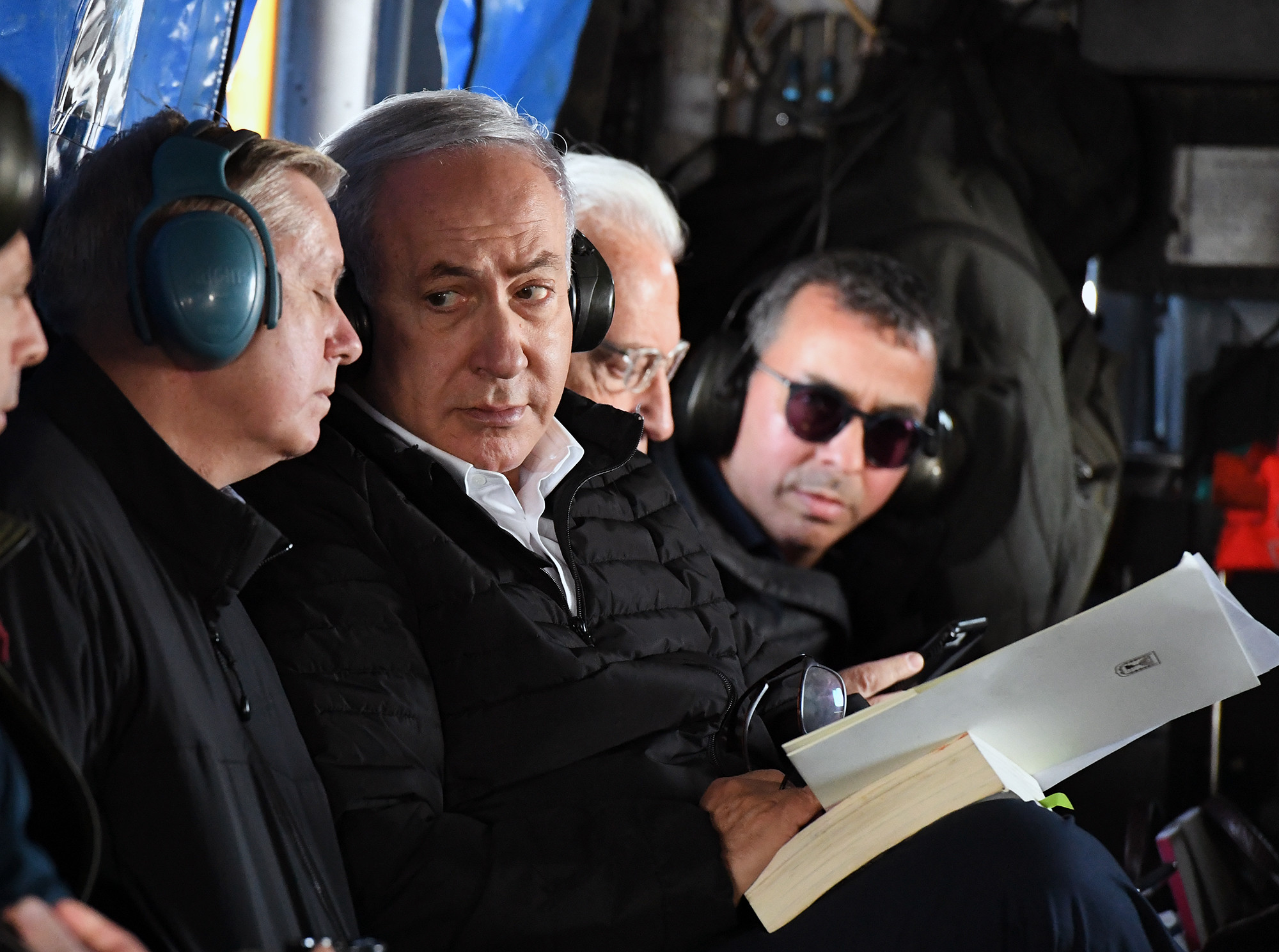
Israeli Prime Minister Benjamin Netanyahu between U.S. Senator Lindsey Graham, left, and
U.S. Ambassador to Israel David Friedman, on a trip to the Golan Heights in March 2019 for a briefing by an Israeli military commander on the situation in the region (Matty Stern/U.S. Embassy Jerusalem)
Connolly a Formidable Anti-war Voice
What cannot be easily silenced is Connolly’s strong voice.
She succeeds Michael D. Higgins, also a former Irish Labour Party member, who served two seven-year terms and whose recent criticism of Israel played a role in Israel withdrawing its ambassador from Dublin in December 2024.
Connolly may take even firmer stances on foreign policy.
Before the October 24 vote on banning imports from Israel, she denounced NATO’s “warmongering” and Israel’s genocidal acts in Gaza. She also supported a border poll on Irish reunification, as set out by the 1998 Good Friday Agreement, which ended decades of violence in Northern Ireland.
Addressing a frequently hostile press, she described Hamas as “part of the civil society of Palestine” and insisted that Palestinians alone should decide their governance, countering the Trump administration’s twenty-point neo-colonial ‘peace’ plan. She bluntly called Israel “an out-of-control state committing a genocide.”
On questions about the Western proxy war in Ukraine, the former lawyer and psychologist said the conflict demands diplomatic solutions, warning that Germany’s remilitarization evokes memories of the 1930s military build-up.
Her rise to Ireland’s ceremonial leadership and moral voice worldwide resulted from a diverse opposition uniting their votes, possibly learning from past setbacks.
In June last year, Connolly joined veteran activists, including former northern civil rights leader Bernadette Devlin Aliskey, to back Clare Daly’s unsuccessful attempt to keep her European Parliament seat.
Daly, a staunch NATO critic, was hampered by media smears alleging she was a Russian asset and competition from several other left-wing candidates.
This time, solidarity among left parties—Sinn Fein, Labour, People Before Profit, and the Social Democrats—coalesced behind Connolly.
Electing her to a mostly symbolic role could prove key in countering pro-war and anti-genocide narratives which dominate establishment media.
From Threats to Threat Inflation
These messages have accelerated rapidly.
A report titled Peak Ireland from the London-based Policy Exchange, a security-state affiliated think tank, published on October 30, accused Ireland of freeloading “off the security umbrella provided by the US, the UK, and other European states.”
The report warned that Ireland remained at risk from U.S. tariffs and shifting trade negotiations due to its continued challenge to American foreign policy. The coverage appeared prominently across Ireland’s main media.
Notably, Robert C. O’Brien penned the foreword to this document.
In his Wall Street Journal article, O’Brien also criticized Ireland’s meager defense spending, which is just 0.2 percent of GDP.
“Ireland lacks key technical defenses, like radar systems and efficient cyber and human intelligence networks, leaving the country open to espionage and cyberattacks from Russia, China and extremist nonstate actors,” he asserted.
https://t.co/4s2DW9JgIM pic.twitter.com/vvffBEnHrE
— Barry Andrews MEP (@BarryAndrewsMEP) November 6, 2025
A number of news outlets have echoed these themes, citing concerns expressed by unnamed Irish and European security officials about Ireland’s preparedness for security tasks ahead of its six-month term holding the E.U. Presidency starting next July.
Of particular worry was the absence of radar coverage and defense capacity while hosting the European Political Community summit, usually attended by around 50 world leaders. An unnamed Baltic delegation reportedly expressed security concerns during a recent meeting in Dublin.
These stories hinge on an unproven narrative that Russia is conducting hybrid warfare by sending drones covertly into European airspace to test defenses.
Repeated unverified claims suggest drones are launched from Russian oil transport tankers, part of the so-called ‘shadow fleet,’ though no proof has been disclosed.
Recent unexplained drone sightings have temporarily closed Brussels Airport and caused similar disruptions in Denmark this past September.
Taken together, these reports appear designed to stoke anxiety, paving the way for Ireland to adopt a militarized and NATO-aligned posture.
Paradoxically, earlier this year the Irish Defence Forces donated their critical Giraffe radar systems, which guide anti-aircraft missiles, to Ukraine. According to The Irish Times, the government is now hurriedly acquiring a costly new counter-drone system.
Neutrality Under Threat
Central to these propaganda campaigns is an attempt to intellectually sway Irish politicians and citizens away from maintaining neutrality, a policy the state has upheld since its foundation in 1921.
In a widely covered statement earlier this month, Sergiy Kyslytsya, Ukraine’s first deputy foreign minister, declared neutrality “a thing of the past.”
Speaking at the European Commission offices in Dublin, he cautioned that Russia could target distant nations with drones or cripple infrastructure through cyberattacks. He urged Ireland to follow the example of former neutral countries Finland and Sweden in confronting such threats.
Others have voiced more blunt contempt, not only for neutrality but also for Irish sovereignty.
British Rear Admiral Chris Parry, a former high-ranking NATO officer, told members of the UK Parliament and House of Lords last week that a united Ireland would pose a strategic danger to Britain.
He argued that losing Northern Ireland would exacerbate the threat posed by Chinese and Russian submarines and suggested NATO should conduct naval exercises in Irish waters regardless of Dublin’s consent.
In a country with such strong memories of colonial rule and widespread awareness of Western war propaganda, Parry’s remarks might pressure the Irish government toward compromising neutrality but are also likely to provoke significant public opposition.
Unpicking Triple Lock
A crucial step toward integrating Ireland into NATO-influenced EU security frameworks involves dismantling the Triple Lock, a safeguard designed to keep the country out of Western military interventions.
This Triple Lock limits the deployment of Irish Defence Forces abroad to no more than 12 personnel unless three conditions are met: a UN Security Council mandate, cabinet approval, and Dáil Éireann (parliamentary) consent.
Therefore, the government cannot act independently, even if securing parliamentary backing, nor can it bypass the UN despite pressure from the EU and NATO countries.
European NATO members are advocating for peacekeepers to be sent to Ukraine—an idea Russia has indicated it will reject in any peace negotiations.
In September, Taoiseach Micheál Martin spoke with Zelensky by phone about peacekeeping and potential ceasefire prospects.
While the Irish government has not publicly connected these issues, it is moving forward with legislation to remove the need for a Security Council mandate for peacekeeping missions, effectively establishing a Double Lock.
Connolly may express opinions on this matter, potentially pressuring the government to hold a referendum to amend the Triple Lock, though officials insist this is unnecessary and does not impair neutrality.
While Connolly lacks legislative power, she can use discretionary tools such as referring bills to the Supreme Court for constitutional review. Nothing in the Irish Constitution restricts her public statements.
One media report indicates preparations for a visit by Zelensky, possibly in December. Whether Connolly would formally meet him remains undecided; such an encounter could carry risks for both parties.
A public meeting with Zelensky might amplify pressure on Connolly to adopt a more NATO-aligned stance.
Conversely, Zelensky might hear some candid truths on camera, mainly that diplomacy is essential and that exaggerating the Russian threat risks triggering a full-scale war between European states and Russia.
Connolly is poised to serve as an essential and principled political shield against attempts to flood Irish society with pro-war propaganda and coerce its citizens into abandoning their anti-colonial, anti-war traditions as NATO’s influence grows.
Original article: consortiumnews.com



